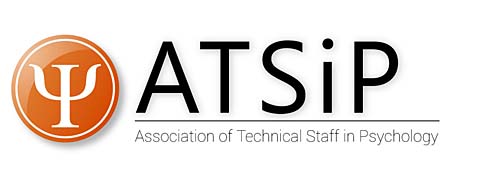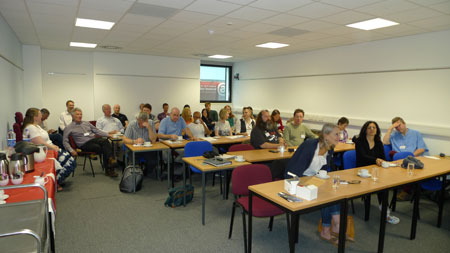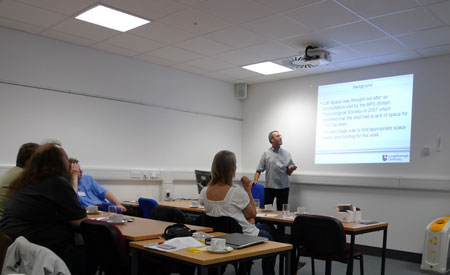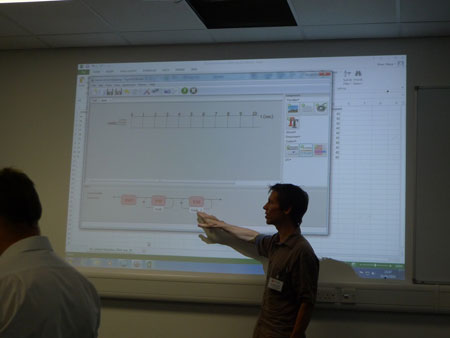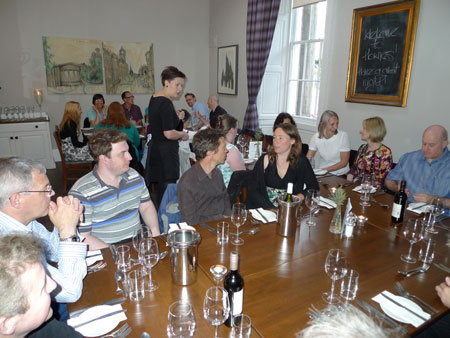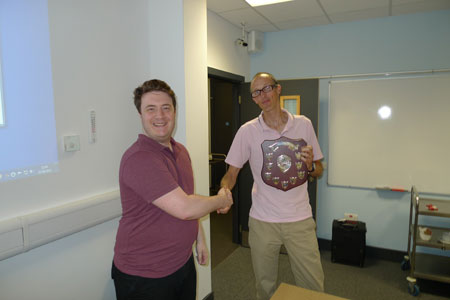|
|
ATSiP ANNUAL CONFERENCE
Edinburgh Napier University 25th-27th June 2014
|
| ATSIP Edinburgh Report 2014 Location and accommodation:
ATSIP travelled back to Napier UNiversity for the 29th Annual Conference. The accommodation was in Halls of Residence. |
|
| The Conference:
Abstracts to the talks:
Biopac and Dance Psychology Noel Taylor r.n.taylor@herts.ac.uk University of Hertfordshire
Biopacs new Bionomadix range allows for the un-tethered measurements of a range of bio-physical responses. Dr Peter Lovatt and his team at the University of Hertfordshire are investigating whether dance has a beneficial effect on the ability of Parkinson Disease sufferers to manage their symptoms. The talk will demonstrate one of the methodologies we may deploy, using the Bionomadix hardware, and invite suggestions as to how the methodology might be refined and improved. . |
Edinburgh Castle |
Teaching so that it sticks (forum) Maria Shaw M.Shaw@napier.ac.uk Edinburgh Napier University The most problem each year is that students are losing work through not remembering where their files are stored or they are all in one particular folder. Do refresher class for students. User guide, still don’t get it. Use Moodle, most common errors. Motivation of students and students should be able to solve it themselves. 24 hours later Clinics How do you get students to learn? What strategies can be used? Using a check list of what problems are happening. Questions could be by email or face-to-face. Questions put up in Moodle Forum where students can post questions by students or by email. Answers through forum on Moodle
|
|
Quick, quick, slow: Is timing accuracy getting worse in computer-based studies and could this be affecting your ability to replicate? Dr Richard R. Plant, CPsychol, CSci, AFBPsS The Black Box ToolKit Ltd http://www.blackboxtoolkit.com/aboutus.html Many researchers make use of computers to present stimuli, interface with other equipment and record responses. There is a tacit understanding that achieving consistency may not be as easy as simply entering identical parameters into different hardware configurations or software packages.
With renewed emphasis on replication across the field now might be an appropriate juncture to address the issues at the individual researcher, journal editor and funder levels. Our own research suggests accuracy is getting worse as hardware becomes faster and software for experimental control more complex. In most other fields poorly controlled studies that did not outline methodology fully or state confidence limits for equipment accuracy would not be published.
In this paper we outline the issues, common pitfalls and offer practical solutions, e.g. to move all presentation, synchronisation and response timing off the experimental platform and onto external chronometry whilst adding little or no overhead for the experimenter.
|
View of seminar room |
Eye tracking - what’s currently available and how the technology is being used in the Psychology department and beyond Andy Shaw andy@tracksys.co.uk
TrackSys http://www.tracksys.co.uk/index.php
An introduction to the eye tracking systems currently commercial available with illustrations of how they are being used in a variety of interesting research areas. Concluding with a look towards the development of the technology and what may be coming next.
|
|
Pete Beaman, Loughborough University |
Flexible WIFI laptop lab and CCTV facilities for Social Psychology Teaching Peter Beaman p.e.beaman@lboro.ac.uk
Loughborough University
Interactive and fun? Cyber cafe? Laptop Hub?
The background of the project (BPS visit/accreditation). Need to expand existing facilities student numbers increasing.
The expectation of dept/IT Services, contractors, suppliers and the actual delivery of the infrastructure.
How the Laptop Lab works in principle, pros and cons, updating technology and expectations.
Feedback from students through BOS survey on their experience. Loughborough in London Campus may use this model too.
|
Workshop: PsychoPy Wakefield Carter wlcarter@brookes.ac.uk Oxford Brookes University
PsychoPy is a free open-source experiment builder suitable for a wide range of psychology and psychophysics experiments. It is based on Python but no programming is necessary for most experiments beyond the customisation of a few simple bits of code.
It can easily be taught to undergraduate students and since the stimulus lists are contained in Excel spread sheets, the material for any given experiment can be changed without editing the experiment itself at all. This workshop is a crash course on how to get started in PsychoPy and by the end of the hour you should be comfortable with creating your own experiments from scratch as well as editing the ones presented here. |
Wakefield Carter, Oxford Brooks University
|
Conference Meal |
The McGurk Effect Konstantin Volkman Oxford Brookes University
This study addresses the question of whether audiovisual speech integration is an automatic and unconscious process or subject to attentional demands. The experimental approach utilised a variant of Garner’s (1974) speeded classification task, with audio-visual stimuli comprising of disyllabic non-words. Observers had to classify the first syllable while the second syllable was experimentally manipulated. The rationale under consideration was that in a series of trials, task-irrelevant variations of the second syllable will slow down response latencies, henceforth called syllabic interference effect. This effect was produced in Experiment 1. Experiment 2 demonstrated that this effect can also be induced by virtue of a McGurk percept while Experiment 3 illustrated the elimination of such effects on the basis of a McGurk percept. Further, participants repeatedly attended the experiments over five consecutive days. Findings reinforce the claim that audio-visual integration occurs before selective attention can be allocated and support the assumption of it being an automatic process. The observed stability of the effects over time suggests that audio-visual integration is immune to top-down control often achieved through practice and thus represents a purely perceptual phenomenon. Results are discussed with regards to the question of cognitive impenetrability of audio-visual speech integration.
|
Anthony Mee receiving Ken Nicholson Award |
An Introduction to the Benefits of Arduino in Psychology Research (This talk Won The Keith Nicholson Award Prize 2014) Anthony Mee anthony.mee@plymouth.ac.uk
Arduino is an open-source electronics prototyping platform based on flexible, easy-to-use hardware and software. It is inexpensive, cross platform, has a simple, clear programming environment and is open source with extensible software and hardware. I will demonstrate how you can provide a simple and effective solution to measure biometric sensor data for experimentation, with examples using GSR and heart rate sensors. We will investigate the hardware, software and the straight forward set up process, as well as the potential to expand this technology further to take a proactive role in your school research projects. |
Presidential Talk Peter Beaman p.e.beaman@lboro.ac.uk Loughborough University
The last year reviewed including in order:
• HEA Employability Guide for Psychology departments, July 2013 At Aston University launched the Guide • ILM Leadership/Team Skills, September–December 2013 – assessment and goals/team work • Achievements in terms of BPS Accreditation (amended Framework and also supplementary document Oct 2014 • BPS ATSIP Research Award, won by Ian Harrison http://www.bolton.ac.uk/MediaCentre/Articles/2014/Mar2014-22.aspx HEA ATSIP Technician/Demonstrator Award February 2014 Paul Gallimore https://www.heacademy.ac.uk/person/2694 March 2014, HEATED (Local update) Meeting at Loughborough January 2014, and Trent Nottingham June 2014 on Do Technicians Teach? • Summary of Technicians Conference first at Loughborough University in February 2014 • Change Academy/work shadowing March 2014 its purpose and aim at the local tech level • Other Professional Development and Training Opportunities, like Coaching Network, Deaf awareness, Fire Safety Awareness, Future Learn (online distance learning) • Shortlisted to new award at Loughborough University called The Extra Mile by Students as ‘unsung hero’ |
|
|
Return to the home page. |
